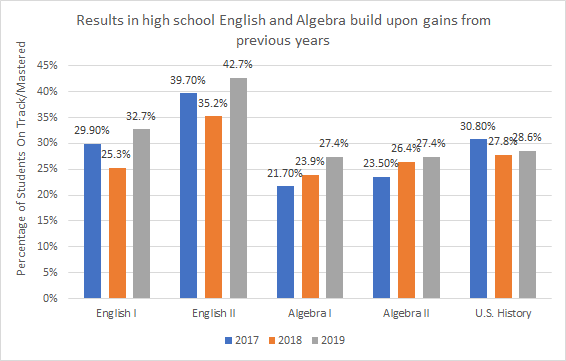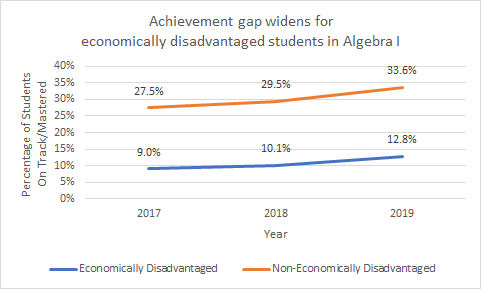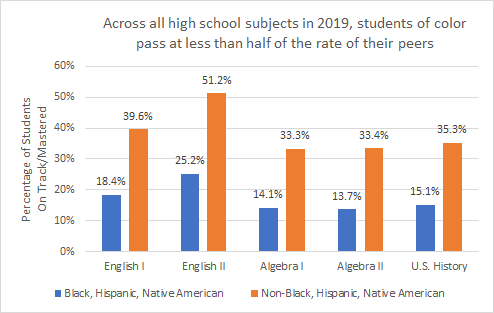
High school is where students accelerate the pace of preparation for college and career, building on a foundation of academic and other learning from their kindergarten through eighth-grade experiences. In recent years, Tennessee has seen historic heights in its graduation rate (89.7 percent as of 2019) and its ACT scores (20.2 as of 2018) that suggest more students are prepared for life after high school than ever before. However, as SCORE explores in our What High School Could Be report, there are numerous signs from within and beyond the high school experience that too many students are not truly prepared for college, career, and life.
Students who have been exposed the longest to Tennessee’s more rigorous academic standards are now in high school. The 2019 TNReady high school results suggest that while there is overall progress across a range of subjects, this progress is not consistent for all students. As Tennessee considers opportunities to improve college and career readiness in high schools, this year’s results serve as a foundation and a catalyst to guide such work.
For English and Algebra, results show continued increases over the past three years
The 2019 TNReady results show promising overall gains for Tennessee high school students.
- In both English I and English II, the percentage of students on track/mastered increased by almost 3 percentage points from 2017.
- Algebra I had the largest increase of all high school subjects with a near 6 percentage point increase between 2017 and 2019.
- Algebra II saw a similar 4 percentage point gain from 2017.

Widening achievement gap for economically disadvantaged students in Algebra I
Despite statewide gains in Algebra I for all students, the results for student populations needing more support is less promising. Specifically, economically disadvantaged students scored on track or mastered at less than half of the rate of non-economically disadvantaged students. Between 2017 and 2019, the achievement gap between these two groups has widened by almost 2 percentage points, suggesting a need to better serve our low-income students in high school.
Success in Algebra I and other high school math courses are an important signal of readiness for a wider range of college and career opportunities, specifically around the STEM fields. Given that only one in eight economically disadvantaged students appear to have met these benchmarks in mathematics, Tennessee’s work to expand educational and economic opportunity for all students is substantial.

Students of color perform at half the rate of their peers across all high school subjects
While high school subject assessment results in 2019 show increased performance for all high school students across most subjects, there are still notable gaps in achievement for black, Hispanic, and Native American students. Across all high school subjects, students of color perform on track/mastered at less than half the rate of their peers. Algebra II has the largest gap as students of color pass at a rate of two and a half times less than non-students of color. These persistent results call for urgent attention and support for our highest opportunity students.

In the first post of our 2019 TNReady analysis, we highlighted the important and more accurate insights provided by Tennessee’s higher quality standards and assessments. Using that information, this series has highlighted gains and gaps that exist as well as noted progress made but benchmarks not yet reached. While student achievement data tells only one part of the story, it provides all Tennesseans — students, educators, community leaders, and policymakers — with insights into how we might focus our collective energy to improve public education for each Tennessee student.
Peter Tang is director of research at SCORE. Robin Yeh is a SCORE graduate fellow.
More Analysis On Tennessee’s 2019 TNReady Results:
